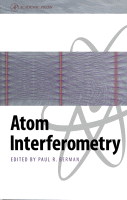Browse content
Table of contents
Actions for selected chapters
- Full text access
- Book chapterAbstract only
Optics and Interferometry with Atoms and Molecules
Jörg Schmiedmayer, Michael S. Chapman, ... David E. Pritchard
Pages 1-83 - Book chapterAbstract only
Classical and Quantum Atom Fringes
Herman Batelaan, Stefan Bernet, ... Anton Zeilinger
Pages 85-120 - Book chapterAbstract only
Generalized Talbot-Lau Atom Interferometry
John F. Clauser and Shifang Li
Pages 121-151 - Book chapterAbstract only
Interferometry with Metastable Rare Gas Atoms
Fujio Shimizu
Pages 153-169 - Book chapterAbstract only
Classical and Nonclassical Atom Optics
C. Kurtsiefer, R.J.C. Spreeuw, ... J. Mlynek
Pages 171-216 - Book chapterAbstract only
Atom Interferometry and the Quantum Theory of Measurement
H.-J. Briegel, B.-G. Englert, ... H. Walther
Pages 217-255 - Book chapterAbstract only
Matter-Wave Interferometers: A Synthetic Approach
Christian J. Bordé
Pages 257-292 - Book chapterAbstract only
Atom Interferometry Based on Separated Light Fields
Uwe Sterr, Klaus Sengstock, ... Jürgen Helmcke
Pages 293-362 - Book chapterAbstract only
Precision Atom Interferometry with Light Pulses
Brenton Young, Mark Kasevich and Steven Chu
Pages 363-406 - Book chapterAbstract only
Atom Interference Using Microfabricated Structures
B. Dubetsky and P.R. Berman
Pages 407-468 - Book chapterNo access
Index
Pages 469-478
About the book
Description
The field of atom interferometry has expanded rapidly in recent years, and todays research laboratories are using atom interferometers both as inertial sensors and for precision measurements. Many researchers also use atom interferometry as a means of researching fundamental questions in quantum mechanics.
Atom Interferometry contains contributions from theoretical and experimental physicists at the forefront of this rapidly developing field. Editor Paul R. Berman includes an excellent balance of background material and recent experimental results,providing a general overview of atom interferometry and demonstrating the promise that it holds for the future.
The field of atom interferometry has expanded rapidly in recent years, and todays research laboratories are using atom interferometers both as inertial sensors and for precision measurements. Many researchers also use atom interferometry as a means of researching fundamental questions in quantum mechanics.
Atom Interferometry contains contributions from theoretical and experimental physicists at the forefront of this rapidly developing field. Editor Paul R. Berman includes an excellent balance of background material and recent experimental results,providing a general overview of atom interferometry and demonstrating the promise that it holds for the future.
Key Features
- Includes contributions from many of the research groups that have pioneered this emerging field
- Discusses and demonstrates new aspects of the wave nature of atoms
- Explains the many important applications of atom interferometry, from a measurement of the gravitational constant to atom lithography
- Examines applications of atom interferometry to fundamentally important quantum mechanics problems
- Includes contributions from many of the research groups that have pioneered this emerging field
- Discusses and demonstrates new aspects of the wave nature of atoms
- Explains the many important applications of atom interferometry, from a measurement of the gravitational constant to atom lithography
- Examines applications of atom interferometry to fundamentally important quantum mechanics problems
Details
ISBN
978-0-12-092460-8
Language
English
Published
1997
Copyright
Copyright © 1997 Elsevier Inc. All rights reserved
Imprint
Academic Press
